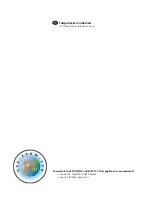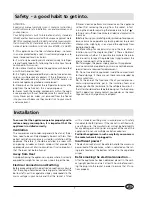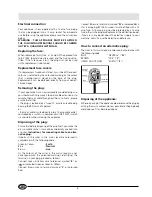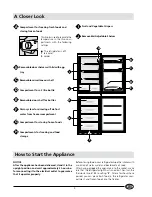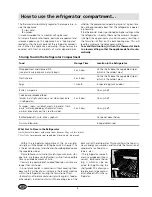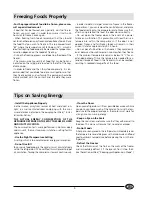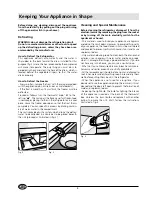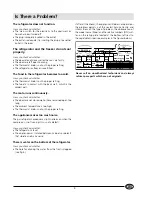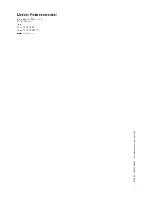
8
GB
Keeping Your Appliance in Shape
Before doing any cleaning, disconnect the appliance
from the electricity (by pulling out the plug or turning
off the general switch in your home).
Defrosting
WARNING: do not damage the refrigeration circuit.
Do not use mechanical devices or other tools to speed
up the defrosting process, unless they have been rec-
ommended by the manufacturer.
How to Defrost the Refrigerator
This appliance defrosts automatically and the water is
channeled to the back toward the drain installed for this
purpose (fig. 2). Here, the heat produced by the compressor
will make it evaporate. The only thing you must do is to
periodically check and clean the hole of the drain, which is
located behind the vegetable crispers, so that the water
drains properly.
How to Defrost the Freezer
- Every so often, remove the frost with the scraper provided
with the appliance (do not use knives or metal objects).
- If the frost is more than 15 mm thick, the freezer must be
defrosted.
Proceed as follows: turn the thermostat knob "
A
" to the ·
setting "
". Then wrap all the frozen and fast-frozen food
in newspaper, placing it either in the refrigerator or in a cool
place. Leave the freezer door open so that the frost thaws
completely. You can speed this process by placing contain-
ers of warm water in the compartment.
The unit is provided with a system which allows the defrost
water to be collected in a container to be placed beneath
the unit (proceed as illustrated in fig. 3).
Fig. 3
Fig. 2
Cleaning and Special Maintenance
Before cleaning the refrigerator, disconnect it from the
electrical mains (by removing the plug from the socket
or by turning off the main electricity switch for the
apartment or house).
- The materials used to build your appliance are hygienic
and do not transmit odors. However, to preserve this quality
of your appliance, the food stored in it must be well closed
and covered to prevent spills which could stain it and cause
unpleasant odors.
- Only water and baking soda. To clean both the interior and
exterior, use a sponge with warm water and baking soda,
which is, among other things, a good disinfectant. If you do
not have any in the house, you can use a neutral soap.
- What not to use. Never use abrasives, bleach or ammonia.
Solvents and similar products are strictly prohibited.
- All the removable part should be taken out and allowed to
soak in hot water and dishwashing soap. Rinse and dry them
well before putting them back in the refrigerator.
- When the appliance is not used for a long time. If you
decide not to use the appliance (during the summer), it must
cleaned and the doors left open to prevent the formation of
mold and unpleasant odors.
- Replacing the light bulb. The bulb for lighting the interior
of the appliance is located at the back of the thermostat
box. Unscrew the burnt bulb and replace it with another
bulb of no more than 15 Watt, follow the instructions
illustrated in fig. 4.
Fig. 4


